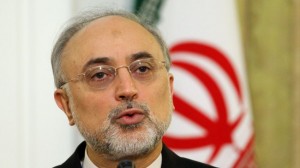 Does the issue of the Arak heavy-water nuclear reactor present an obstacle or a breakthrough for the completion of a comprehensive agreement between Iran and the 5+1 Powers (US, Britain, Germany, China, France, and Russia)?
Does the issue of the Arak heavy-water nuclear reactor present an obstacle or a breakthrough for the completion of a comprehensive agreement between Iran and the 5+1 Powers (US, Britain, Germany, China, France, and Russia)?
Hours after an official’s remarks indicated Tehran might be taking a hard line on the status of the reactor, the head of the Atomic Energy Organization of Iran— former Foreign Minister Ali Akbar Salehi — issued a clarification that points to Iranian compromise for an agreement.
The US and European countries have called for the conversion of Arak, due on-line at the end of 2014, to a light-water reactor. They say this will remove the threat of plutonium by-product being used for a nuclear weapon.
On Saturday, AEOI spokesman Behrouz Kavalkandi told Fars News, the outlet of the Revolutionary Guards, that Arak must remain a heavy-water reactor. His reported comments offered no indication of compromise in the next round of high-level talks, in Vienna on May 7.
However, Salehi was far more conciliatory in a statement to reporters. While maintaining that Arak would not be converted to a light-water facility, he repeated earlier statements that it would be “re-designed” so the amount of plutonium by-product was substantially reduced.
And, in a new remark pointing to a change in Iran’s position, Salehi indicated that the completion of Arak would now be “within the next two or three years”, rather than at the end of 2014.
Fars News, having put out the initial hard-line story, downplays Salehi’s remarks. It tucks away his statement on re-design under the headline “AEOI Chief Stresses Operation of Iran’s Heavy Water Reactor” and ignores his remark about the new timetable for completion.
Nuclear Inspectors Begin 3-Day Visit
A team of International Atomic Energy Agency inspectors arrives in Tehran on Sunday to meet senior Iranian officials and visit uranium facilities, in line with an agreement signed last November.
The inspectors will meet officials of the Atomic Energy Organization on Monday before going to the Saghand uranium mine and Ardakan uranium-processing plant in central Iran.
Larijani: “Free Elections Only Way to End Syria’s Crisis”
A team of International Atomic Energy Agency (IAEA) inspectors is slated to arrive in Tehran on Sunday to meet with senior Iranian nuclear officials and visit the country’s nuclear facilities in accordance to the agreement signed by the UN nuclear watchdog agency and the Atomic Energy Organization of Iran in November.
The IAEA inspectors are scheduled to meet AEOI officials on Monday before their travel to Yazd province to visit Saghand uranium mine in Yazd province in Central Iran and Ardakan Yellowcake production – uranium ore concentrate processing – plant in the same province.
The IAEA inspectors will leave Tehran for Vienna on Tuesday night.
Larijani: “Free Elections Only Way to End Syria’s Crisis”
Speaker of Parliament Ali Larijani has said the only resolution for the Syrian crisis is June’s Presidential election.
“The sole diplomatic solution for the establishment of peace and stability in Syria is the holding of free elections,” Larijani said in a meeting with Mexico’s Ambassador to Iran on Saturday.
Larijani did not explain how the process — certain to put President Assad back in office, despite calls for a transitional governing authority by the opposition and the international community since 2012 — would be “free”.
Although 23 people have registered to run in the election, almost all are little-known and few are likely to obtain the backing of the 35 MPs necessary for inclusion on the ballot.
Most significant challengers to Assad are excluded from candidacy because of a new elections law. In addition, many displaced Syrians will be unable to vote in June.
By EA WorldView
The Iran Project is not responsible for the content of quoted articles.

 QR code
QR code